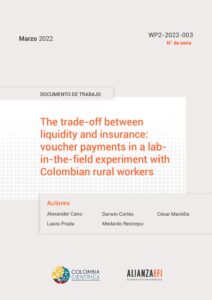We conduct a lab-in-the-field experiment in which 214 rural workers must choose between a cash or a voucher payment for completing a real-effort task. Participants face a twenty-percent chance of suffering a negative shock that will reduce their cash payment by roughly two-thirds. Opting for the voucher reduces the likelihood of the shock by one-half. We employ a multiple-price list with a varying voucher payment and a fixed cash payment to study this trade-off relevant for expanding the coverage and contributions of rural labor formalization. We find that take-up rates go from 32% to 56%, from the least to the more generous voucher. In a reference sample of undergrad students from the same region, take-up rates went from 17% to 33%. Voucher redemption costs are exogenously manipulated by randomly assigning the show-up fee in cash or vouchers. Lower redemption costs induce a higher voucher take-up, but only among students. Being a rural worker with land, and receiving government subsidies in cash, predict a higher voucher take-up.
Autores:
- Alexander Cano
- César Mantilla
- Darwin Cortes
- Laura Prada
- Medardo Restrepo
Palabras clave:
- Agriculture
- Dual labor market
- Informal market
Categorías:
- Proyecto 2
- Documentos de trabajo
